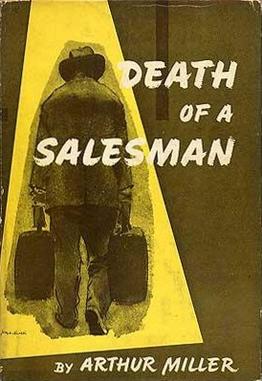Death of a Salesman By Arthur Miller
I listened to the pre-recorded LA Theater Works performance of Death of a Salesman while running in a nearby park. As I stumbled over roots and plodded up and down the hills, it became depressingly obvious how similar my dreams of running glory are to those of Willy Loman’s American Dream.
The key to success in Willy Loman’s America was to be well-liked, good-looking, and charismatic. He wasn’t any of those things. It was that belief that he attributed his struggles on the road to his larger life failings.
Was he right? Maybe, hard to tell. The best salesmen on the road probably were very charming, attractive, and likable. However, the successful people in the play, his brother and the neighbor kid, were notably none of those things. Those characters were hard working, smart, and generous.
What isn’t hard to tell is that he generated great pride and self worth from the sales successes he did have. Willy exaggerated his sales numbers when he got home from a trip. His boys viewed him as a conquering sales hero. He denied the hard realities of unpaid bills, broken down cars, and mended stockings. The disconnect between his prideful version of himself and his actual reality is what leads to most of his problems in the play.
I believe that if I run enough miles and work harder than my competition I will eventually start to win races. I have great pride in the miles I log and how they are getting faster. Walking down the street, I know that I am faster than almost everyone I meet. Is that my reality? Or, like Willy Loman, have I distorted my outlook so that I project a false version of success to my-self and my family.
In college, I was a record breaking, hall of fame football player and a division 3 college sprinter who occasionally would win a race or two. That was 20 years ago. Now, I am a middle aged father of three. I don’t have the prototypical distance runner body type. For the most part, they are little people. I am 6’3” and weigh a lean 200 pounds. I just finished 22 out of 186 in a local half-marathon where the winner had already changed by the time I stumbled across the finish line. My memories of winning races are getting hazy and my results are showing little promise of it ever happening again.
The parallels to Willy Loman’s career are disappointing. We both head out on the road with a self-perpetual reality denying attitude that said just maybe this time we will get it right and our dreams will come true. Willy needed the big sales trip to earn enough commissions to pay off the mortgage and bills. I need to maintain a 6 minute per mile pace to win the big road race next spring.
It never worked out for Willy and it probably will never happen for me either. Should I quit? Should I realize the futility in chasing my unrealistic goals and just be happy achieving basic health metrics? What is the point of dreaming of a better life if the harsh reality will inevitably lead you to failure and disappointment?
The traditional motivational speaker’s answer is an emphatic “NO, Don’t quit!” Instead of focusing on the results, focus on the day to day grind. Learn to love the work. Lean into the struggle. Embrace the pain. Enjoy the journey not the destination. The place you end up is rarely where you intended to go when you started. Cliché after motivational Cliché…
Would Willy Loman have been happier at the end of his life if he saw a failed sales trip as an opportunity to get better rather than as an indictment on his character? Would I be filled with joy and optimism if I let the “runner’s high” wash over me after a long hard run rather than laying on the bathroom floor sipping water while waiting to throw it up?
Obviously yes. I just wish it was that easy. The realities of unpaid bills, broken appliances, and leaky roofs were hard for Willy to ignore. Good vibes and small improvements are great. But, what do I do when they don’t mask the awful stench of 21 other racers crossing the finish line before me?
Willy Loman should have gotten another job that he could both succeed in and keep his self-confidence. I should pick a fitness hobby that I stand a better chance of winning. Or better, one that doesn’t ask me to try to win and just have fun doing it.
Willy turned down his new job offer. It remains to see if I will learn from his mistake.

